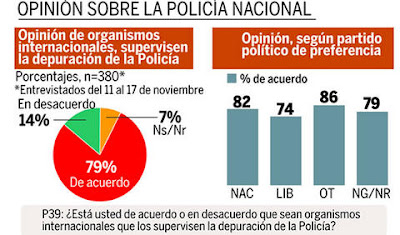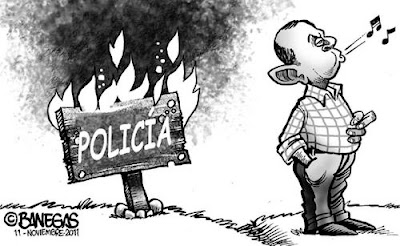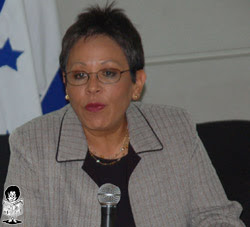
National Director of Honduran Police, Ricardo Ramírez del Cid
Image: Diario Tiempo, Honduras
Image: Diario Tiempo, Honduras
Bold headline, regurgitating official statements, but the reality is something quite different. [All links are in Spanish unless otherwise noted.]
Police suspensions
Some number of police agents and officials have been suspended. It is unclear exactly what 'suspended' means and some news articles have used the term 'separation'. If and when the charges are proven, these employees will be permanently removed from duty, always respecting the law, and their human and employment rights. Police spokesman Hector Ivan Mejía referred to "isolation" so that they can't interfere in investigations, but would not name names or the reasons for the suspensions. News reports have variously reported that the list includes 32, 38, 40, and 41 police, including up to nine mid- to high-level officials. Reader comments on the news articles clamored for names and photos of the suspended agents.
Some unknown number of the approximately 40 police could not be served with the written suspension notice on Monday because they requested vacation and the authorities, for some reason, cannot suspend them while they are on vacation. Similarly, some of the agents simply did not report for work on Monday so their notifications could not be served either.
The list has been sent to the Ministerio Público (MP) who has assigned five prosecutors to perform "profound investigations". Human Rights prosecutor Sandra Ponce has expressed concern that the MP wasn't called in by the Ministry of Security to observe the separation process, fearing that could result in legal flaws for which the accused could appeal.
If prosecutors do not find misconduct, the suspensions could still stand because of administrative violations, but there again, the employees are still entitled to the appeals process. The police in question will have 6-9 months to appeal and could be returned to duty as they often have been in the past. Always trying to save face, police spokesman Héctor Iván Mejía insists that the suspensions are a result of some administrative error or omission, not because they have proof of illicit acts. If that was the case, one would wonder why it couldn't be handled internally through normal administrative procedures rather than through investigations by the prosecutors.
El Heraldo reports that another shake-up of higher level officials is in process and that a list of commissioners accused of administrative faults and proposed for suspension is in the hands of President Lobo waiting for signature. Various police on that list are being investigated for illegal enrichment. This was later denied by police officials.
The list
Despite the secrecy, the list was leaked. The following are the suspended police, all of which are said to be from the "Cartel" La Granja police post in Tegucigalpa [in English] except as noted, according to El Libertador. In parenthesis are my comments and alternate spellings of the names.
LISTADO DE POLICÍAS SUSPENDIDOS (list of suspended police):
1. Subcomisionado de Policía Mario René Chamorro Gotay (who was replaced by Barralaga at La Granja, before that served at Los Dolores)
2. Comisario de Policía Einer Maryino Moncada Martínez (Elner; prior chief over La Granja)
3. Comisario de Policía Leonel Osmín Merlo Canales (Kennedy post, Tegucigalpa)
4. Comisario de Policía Nelson Martín Smith Hernández (La Esperanza, Intibuca)
5. Subcomisario de Policía Dorian Sobalvarro Buezo (San Francisco, Tegucigalpa)
6. Inspector de Policía Rosel Armando Nájera Hernández (old criminal charges of kidnapping)
7. Subinspector de Policía Zachary Mauriel Pineda Carbajal (Sachary, Rachary; old criminal charges of homicide, bank robbery)
8. Subinspector de Policía Essaú Gonzales Corea (Gracias, Lempira)
9. Subinspector de Policía Javier Armando Rivera López
10. Clase I de Policía Juan Gabriel Sosa Olmedo
11. Policía Manuel Eduardo Mondragón
12. Policía Eleazar Lorenzo Mejía
13. Policía José Reinaldo Turcios Corea
14. Policía Altair Castro Carrasco
15. Policía Carlos Alexis Sierra Rodríguez
16. Policía Jairo Javier Meza Pérez
17. Policía Miguel Antonio López López
18. Policía Leonel Martínez Castillo
19. Policía Javier Isaac Padilla Núñez
20. Policía Norlan Ariel Rugama Flores
21. Policía Joel Antonio Valladares
22. Policía Mauricio Moreno
23. Policía Gerson Alejandro Cruz Cruz
24. Policía Dennis Saúl Fúnez
25. Policía Miguel Ángel Castillo Ramírez
26. Policía Juan Ángel Zepeda Gonzales
27. Policía José Guadalupe Ordóñez Acosta
28. Policía Carlos David Quevedo García
29. Policía Alex Antonio Rodríguez
30. Policía Mario Iván Martínez Soriano
31. Policía Santos Alexis Morgan Mairena
32. Policía Ricla Wulmara Mendoza Córdova
33. Policía Edwin Francisco Zepeda
34. Policía Carlos Roberto Lagos Lagos
35. Policía Lucio Godoy Reyes
36. Policía Neptalí García Corea
37. Policía Emanuel del Cid Manueles
38. Policía Orlando Ramírez Flores
El Heraldo published the same list, adding that provisionally suspended were also ex-director of DNIC Marco Tulio Palma and Jorge Alberto Barralaga, responsible for giving days off to the four accused murder suspects. EH was also informed that one of the suspended agents was separated after discovering a million-plus lempira bank account. In this much commented upon article, several readers claimed that sub-commissioner Mario René Chamorro Gotay is an honest man and must be on the list by mistake. Chamorro apparently served as chief over La Granja from March 2010 until he was rotated out and replaced by Barralaga at the end of September.
Some of the agents are currently in custody for participation in homicides and bank robberies — though I did not find any crime news articles for any of the names on the list with the exception of two (Pineda Carbajal and Nájera Hernández; more on them later), indicating that authorities might have been able to keep some police-related crimes from the media. Conversely, none of the police agents for which I have reported recent accusations of criminal activity (here, here, and here, in English) were on this list.
Note that for the most part, all of these police were currently or in the past assigned to a few stations in Tegucigalpa, so it doesn't appear that any investigations have yet commenced in other parts of the country, despite authorities claims that all 14,000 police employees will be investigated. Tip: start with the ones who have been accused of crimes rather than diluting and delaying action by trying to investigate all 14,000.
Drug and lie detector tests
Authorities announced that voluntary drug and lie detector tests would be given to all police employees starting with the highest level officials. Authorities state over and over again that they have no legal power to obligate police employees to submit to drug or lie detector tests, just as they similarly state that they have no power to fire police agents accused of crimes, no matter how heinous, unless and until they are found guilty in a court of law. It is certainly hard to believe that employees flipping burgers at Burger King can be required to take drug tests, while police officers carrying guns cannot be.
Reading the Ley Organica de Policia, I don't understand why authorities are claiming that they have no right to subject police agents to drug tests. Article 33, paragraph 12, prohibits "the use of illicit drugs in any form" and gives the directorates the right "to order and apply blood and other tests that scientifically can demonstrate the use of the same." Article 115 states that a member of the national police submitted to a criminal process or disciplinary procedure for a serious offense will be suspended from their functions. Article 123, paragraph 2) describes drug use as a serious offense and paragraph 14) also describes a positive drug test as a serious offense. Article 126 clearly states that police can be fired for any of the following acts which include "1) for noncompliance of violation of any of the obligations or prohibitions established in the law". If there is some loophole elsewhere in the law that requires the police department to continue to provide uniforms and weapons to accused murderers, kidnappers, robbers, and drug addicts, obviously that law should be changed immediately.
Hopefully, these will be serious drug tests. In one La Ceiba laboratory that does drug testing for private companies, job applicants are told to "bring in a urine sample" when they come to the clinic. That sort of testing kind of defeats the purpose, don't you think?
Though much ado was made about testing all police and about the top-level authorities setting an example by voluntarily being the first to take drug tests, only 12 persons were actually tested on Monday. Missing from the list of those top level people tested was Joaquín Mejía Alvarenga, Director of the Preventative Police. On Tuesday, it was announced that 36 unnamed additional officials were drug tested. Forty-eight down and 1,352 to go.
The urine tests will check for cocaine, marihuana, heroin and amphetamines. When asked when basic level police would be tested, National Director of the Police Ricardo Ramírez del Cid said the situation is difficult and the tests are expensive, but that police suspects would be given tests — but again stressing that the tests are voluntary.
On Tuesday, in typical Keystone Kops or upside-down world fashion, the results of the first 12 drug tests were given directly and privately to the individuals, with no results provided to either the MP or police authorities, and of course, with no indication to the media if any of the tests had positive results. So if these individuals had any personal doubts about whether or not they were consuming illegal drugs, now they know. So much for that ruse. Save the taxpayer money. Don't do any more pointless drug tests. There are times that I can't think of anything to say except TIH (this is Honduras) and impunity is going to reign regardless!
Echoing President Lobo and Minister Bonilla, Martínez del Cid went on to say that other evaluations must be gradual and that "in some 10 or 12 years, we are going to have the police that we deserve".
In an interesting turn of events, Ramírez excused himself for not taking the lie detector test as he had planned. He explained that "to apply the lie detector test, a more complex process is required." I don't know if that means that he wasn't prepared to take the test or whether it means that the police organization is not prepared to give lie detector tests. I think the latter.
Police need to work on credibility
Police lose even more credibility by making bold announcements which they and everyone else knows they are completely incapable of following through on (all police stations will be investigated, all police will receive drug and polygraph tests, police department will be purified in six months, peace and tranquility will reign in Honduras in nine months, etc.). These statements are completely belied by the responses to reporters' specific questions. Additionally, though a certain amount of secrecy is required in open investigations, the police have been less than transparent about the extent of the problems. And if investigations are going to continue for 8-10 years as some have? At what point does the public have a right to know?
Many have suggested that congressmen, ministers, judges, prosecutors, and political candidates should be subject to the same tests, though there is no discussion of that ever happening.



















 Welcome to my Blogicito —
Welcome to my Blogicito — 








